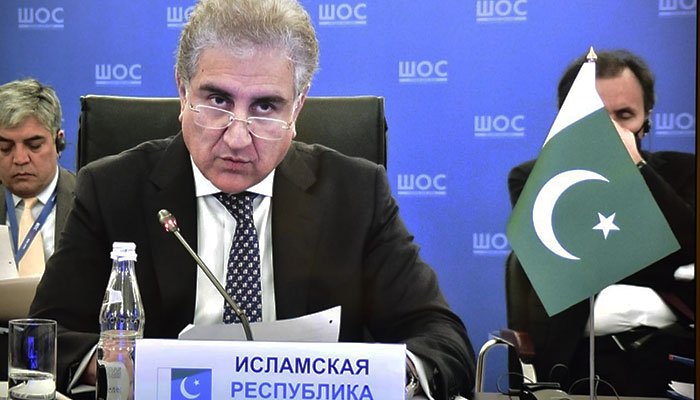Cooperation should drive international politics not confrontation: Qureshi
FM reaffirms Pakistan's belief in "centrality of Shanghai spirit" and says that platforms like SCO "exist as beacon of hope"
Foreign minister Shah Mahmood Qureshi told members of the Shanghai Cooperation Organisation (SCO) on Thursday that cooperation should drive international politics and not confrontation.
In a series of tweets following his address at the SCO Council of Foreign Ministers meet in Moscow, Qureshi wrote: "In today's environment, full of zero-sum prophecies, it is cooperation not confrontation that should drive international politics."
The foreign minister said in his address to the forum that he had reaffirmed Pakistan's belief in "the centrality of the Shanghai spirit" and said that platforms like the SCO "exist as a beacon of hope".
During his address, Qureshi said any unilateral and illegal measures to change the status of disputed territories "run counter to the Shanghai Cooperation Organisation's objective of amity in the region and must be opposed resolutely".
The minister said that he had stressed on the peaceful resolution of outstanding disputes as per the United Nations Security Council's resolutions.
Qureshi went on to share that he had "highlighted the opportunity to foster greater regional [co-operation] in this time of [COVID-19] crisis".
"Pakistan has flattened COVID-19 curve to become a global best practice," he said.
The foreign minister said Pakistan offered to share its strategy with member countries "in cognisance of the spirit of the SCO and working together against common threats".
He said that stability in Afghanistan "is vital for regional prosperity" and was discussed during the meet.
"Pakistan has assiduously supported efforts for peace and reconciliation that is Afghan led and Afghan owned," said the foreign minister.
"I stressed on SCO as key for connectivity and CPEC, flagship of BRI, supplements SCO vision for regional integration," he added.
According to a statement by the Foreign Office, Russian Foreign Minister Sergei Lavrov, the chair of the meeting, extended the invitation to the foreign minister.
The SCO-CFM is the highest forum of SCO after the Council of Heads of State (CHS) and the Council of Heads of Government (CHG), the statement said, adding that it deliberates on important regional and international issues and considers documents for approval and adoption by the Council of Heads of State.
“The Moscow SCO-CFM will consider more than 20 documents for subsequent adoption in the SCO Council of Heads of State. It will also adopt a Joint Communiqué reflecting member states’ unified stance on important regional and international issues,” the statement said.
The foreign minister will also have bilateral meetings on the sidelines of the CFM.
SCO’s major objectives include promoting confidence and good-neighbourly relations among member states; strengthening regional peace, security, and stability; and creating a framework for effective cooperation in political, cultural, trade and economy, science and technology, education, energy, transportation, tourism, environmental protection, among other fields.
Besides Pakistan, SCO’s current membership comprises China, Russia, India, Kazakhstan, Kyrgyzstan, Tajikistan, and Uzbekistan.
“SCO is an important forum for further enriching our deep-rooted historical and cultural links with member states, providing these ties a sound economic foundation, and promoting Pakistan as a regional trade and transit corridor,” the statement noted.
Since becoming a member in 2017, Pakistan has been “actively” contributing to working towards achieving SCO’s multi-sectoral agenda through participation in various SCO mechanisms.
From 2005 to 2017, Pakistan was an Observer in SCO, the Foreign Office added.
-
Security forces gun down 30 terrorists in multiple IBOs in KP: ISPR
-
MQM-P calls for new province in Sindh
-
US report validates Pakistan military edge over India: PM
-
Banned TTP poses serious threat to Pakistan security: UNSC panel
-
CM Afridi clarifies remarks on by-poll after ECP requests army deployment
-
Dubai sees 3.2m Pakistani passengers in 2025 as airport sets new milestone
-
Security forces kill 23 Indian proxy terrorists in KP's Kurram
-
Pakistan to construct island to boost oil exploration: report












